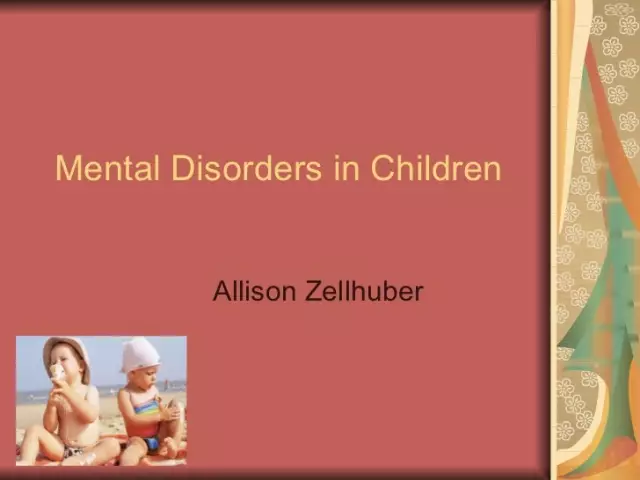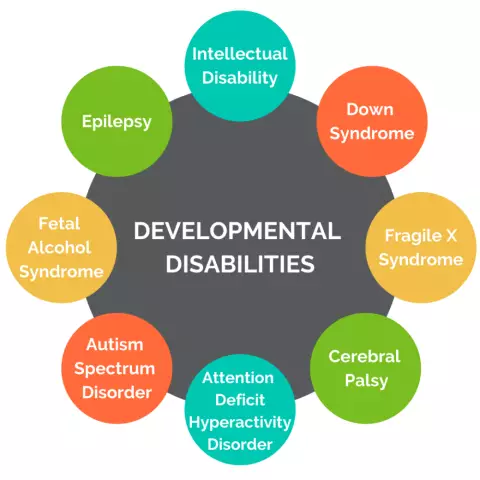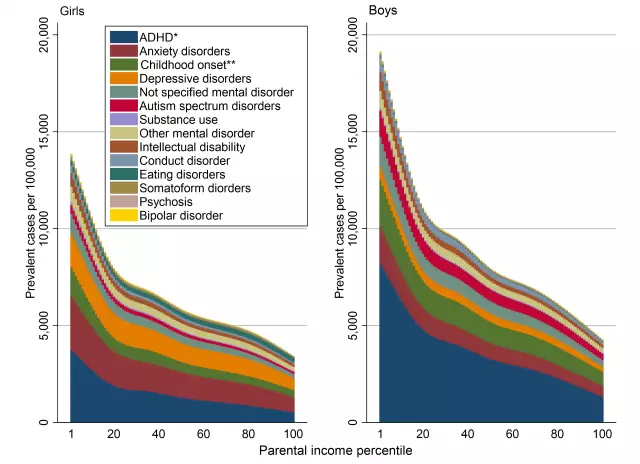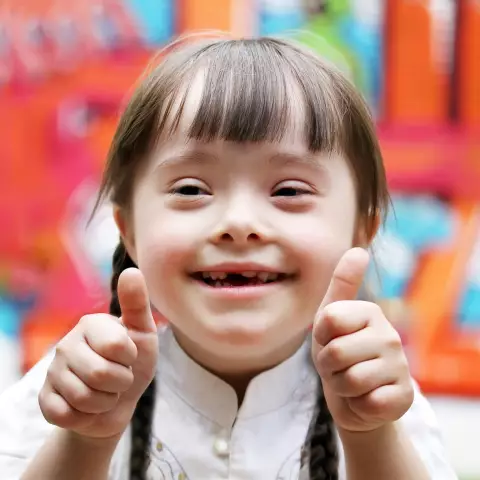- Author Rachel Wainwright wainwright@abchealthonline.com.
- Public 2023-12-15 07:39.
- Last modified 2025-11-02 20:14.
Complex developmental disorders in children
When children with complex developmental disabilities are born in a family, life is divided into "before" and "after". And if the parents have not abandoned the child, then they will have to realize that their baby will have not one, but several violations. Some parents then try to find the best doctors, provide their babies with special treatment, go abroad, go to many sacrifices and efforts, but may eventually find that the result is too insignificant. Other parents simply accept the child with all his ailments and rejoice at his every independent step, watching him with love. And this sometimes gives greater results than the months spent in foreign clinics.
What are complex developmental disabilities

Developmental disorders in children are divided into single (isolated) and multiple (complex). Single disorders are called violations of one of the body systems, for example, hearing or vision. Multiple or complex developmental disorders in children are damage to two or more body systems, for example, deaf-blindness, blindness in combination with speech impairment, mental retardation, coupled with hearing impairment, and so on. Moreover, in our country, disability is determined by the most pronounced violation.
As a rule, in such children, the dominant lesion of one organ or function is detected in the hospital, and the second and even the third defect is discovered much later due to the difficulties of diagnosis. For example, in a child with congenital deafness, a lag in the development of speech appears only over time, or in case of congenital movement disorders, visual or hearing impairments may be lost, especially if the impairments are a consequence of the progression of the disease.
Causes of complex developmental disorders in children
Developmental disorders can have different causes - biological or socio-psychological. Biological reasons include deep prematurity, abnormalities of pregnancy and childbirth, infections transferred both in the womb and after birth, hereditary diseases. The most dangerous for the fetus are rubella, toxoplasmosis, cytomegalovirus, influenza, measles, tuberculosis, syphilis transferred during pregnancy. After birth, neuroinfections - meningitis and meningoencephalitis, as well as complicated measles, scarlet fever and severe flu - can lead to severe lesions.
The socio-psychological reasons for the emergence of complex disorders include poor care, lack of emotional contact with loved ones, indifference and cruelty of adults, deprivation of children of the necessary sensory and mental factors of development, and so on.
Recently, chromosomal diseases are increasingly attributed to the causes of congenital complex developmental disorders. Many children with chromosomal diseases die in the womb and during childbirth, most of those who remain die during the first months or years after birth due to low vitality. Among chromosomal diseases, Down's syndrome, Marshall's syndrome, Wilderwank's syndrome, CHARGE syndrome, Norrie's disease and others are leading.
Survey methods
Children with complex developmental disabilities are limited in their perception of the world. In acute infectious diseases, signs of damage appear simultaneously; in hereditary diseases, sensory disturbances can appear gradually over several months or years. If violations are detected and corrected in a timely manner, it is possible to help the child adapt to this world, make the most of the remnants of vision, hearing, and compensate for developmental delays. Therefore, comprehensive surveys should be carried out as early as possible.
Comprehensive examination of complex disorders includes medical and psychological and pedagogical diagnostics. During a medical examination, a pediatrician, neuropathologist, ophthalmologist, otolaryngologist, geneticist, psychiatrist and representatives of other medical specialties must conduct a series of studies and establish the nature of the physical health and nervous system disorders. Hearing and vision are examined most thoroughly. During neurophysiological examination, EEG and studies by the method of stem and cortical evoked potentials are carried out, which allow one to judge about disorders and lesions of the central nervous system.

Since at an early age children develop especially intensively, with the help of doctors, teachers and psychologists, you can seriously compensate for the violations. It should be remembered that the degree of activity of children with complex developmental disabilities depends on their lifestyle, which is created for them by adults and the environment. If a healthy child easily receives information about the world around him and explores it, then with complex damage to the organs of perception, serious efforts must be made to adapt to this world. And it is much more difficult for children whose mental abilities are seriously affected.
Tactile sensations are often the main way of perception for these children. Therefore, in correctional pedagogy, much attention is paid to practical exercises and illustrative examples. And the best that parents can give at the same time is emotional and physical contact: hugs, motion sickness, and so on. Children with complex developmental disabilities need competent family education and special education. If a child is surrounded by an atmosphere of love and care, then teachers will be able to achieve serious success.
Are there any prospects
It is important for the parents of a special child to know that they are not the only ones who have had a difficult experience. Other fathers and mothers who suffered a similar misfortune, and who were able to find the strength and time to competently adapt their babies, could be a better example and support than a whole staff of experienced psychologists.
There are many families in which children with complex developmental disabilities were brought up, and some of these parents later became authors of books and articles in which they shared their experiences and experience in solving problems. For example, these are the works of Norman Brown, whose son, after rubella transferred in the womb, was born with profound hearing and vision impairments. From domestic authors, the problem is covered by Tatyana Basilova and Nadezhda Aleksandrova.
It is important to remember that every child is subject to learning to one degree or another, taking into account his unique abilities. The result in this case will largely depend on love, understanding, as well as timely help from parents and those around him.
Found a mistake in the text? Select it and press Ctrl + Enter.






